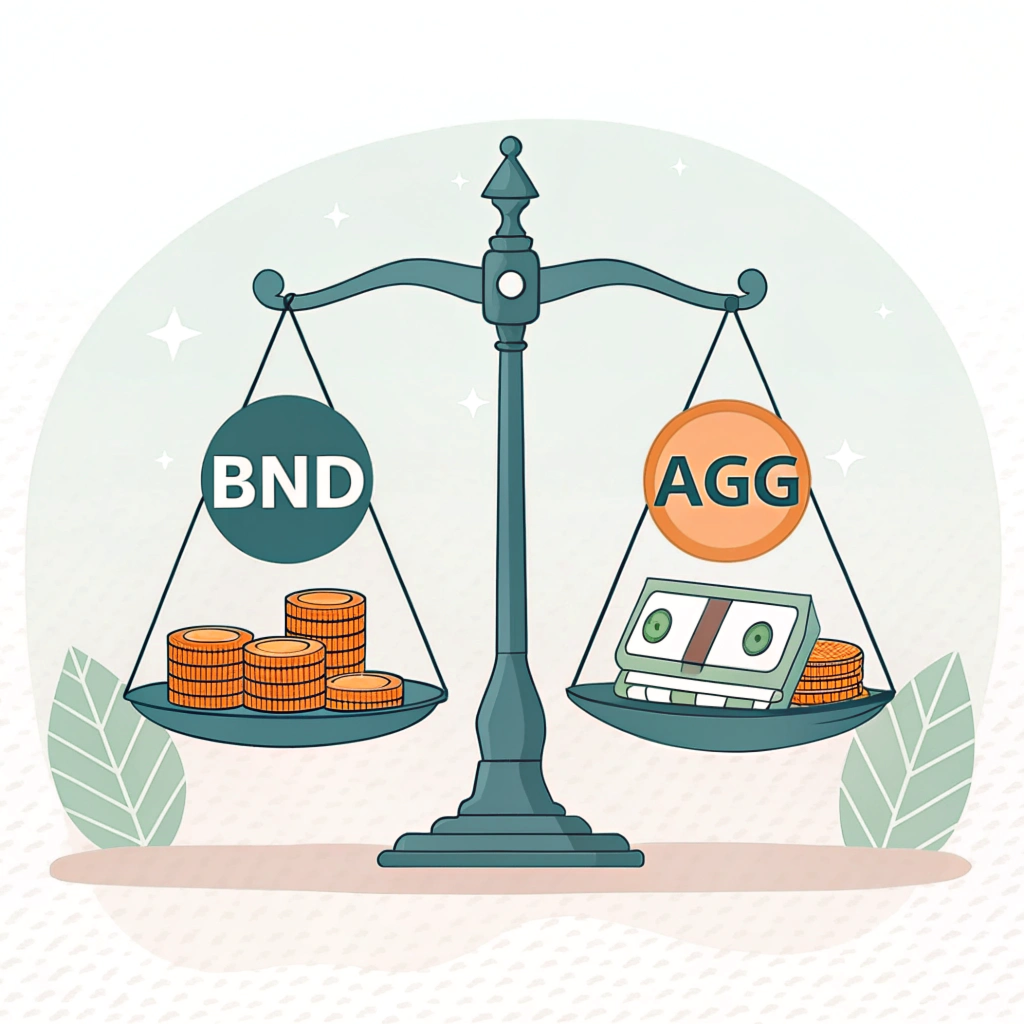
Introduction to BND vs. AGG
Overview of Bond ETFs
In bond ETFs, investors enjoy affordable costs and diversification modes of fixed-income products. These funds are distributed across many bond indices; therefore, one could invest in the entire range of bonds without having to buy them as individual securities. The Vanguard Total Bond Market ETF (BND) and iShares Core U.S. Aggregate Bond ETF (AGG) are the two most popular bond ETFs. Their main purpose is income generation through diversified portfolios of U.S. investment-grade bonds.
Why Compare BND and AGG?
BND and AGG are among the biggest and most popular bond ETFs, usually considered as core holding diversifying portfolios. They are typically the same regarding objectives, but include minor differences in makeup, expense ratios, and performance metrics that may influence decisions for a certain investor. The differences should be understood before going ahead with deciding which option is better to have.
Understanding BND and AGG
What Is BND? (Fund Composition, Holdings, Issuer)
Managed by Vanguard, BND looks to track the Bloomberg U.S. Aggregate Float-Adjusted index. It contains combinations of U.S. Treasury securities, corporates, and mortgage-backed securities. With thousands of underlying holdings, BND offers its holders broad exposure to the U.S. bond market.
What Is AGG? (Fund Composition, Holdings, Issuer)
This is an exchange-traded bond fund managed by the iShares division of BlackRock and is designed to replicate the performance of the Bloomberg U.S. Aggregate Bond Index. Similar to its counterpart, BND, AGG consists of U.S. Treasury bonds, corporate bonds, and mortgage-backed securities. This slight difference in performance can be attributed to a somewhat different weighting methodology used by AGG.
Key Differences Between BND and AGG
Fund Structure & Strategy
While both ETFs track similar indices, BND’s methodology includes a float adjustment, whereas AGG follows the index strictly. This can lead to slight differences in holdings and risk exposure.
Credit Quality & Duration
Both ETFs hold high-quality investment-grade bonds, but BND tends to have slightly more exposure to government bonds, while AGG may hold more corporate debt. Duration—an indicator of interest rate sensitivity—is nearly identical between the two.
Holdings & Asset Allocation
BND holds a larger number of securities than AGG, contributing to broader diversification. However, the overall allocation breakdown is quite similar.
BND vs. AGG: Performance Analysis
Historical Performance Comparison
Both funds have performed similarly over time due to their comparable compositions. However, slight differences in index methodology can lead to minor performance variations.
| Period | BND Total Return | AGG Total Return |
| 1-Year | X% | X% |
| 5-Year | X% | X% |
| 10-Year | X% | X% |
Risk-Adjusted Performance Metrics (Sharpe Ratio, Standard Deviation)
Investors having the BND and AGG should also be inclined towards their respective Sharpe ratios and standard deviation as determinants of their risk-adjusted returns.
Expense Ratios and Costs
BND vs. AGG: Expense Ratio Comparison
Comparatively Small Expense Ratio Both are ETFs that come with low costs, though BND clearly earns the score here with a somewhat lesser expense ratio compared to AGG. Trading Costs and Liquidity Considerations Both ETFs are highly liquid investments, hence making them cost-effective for both the traders and long-term investors.
Trading Costs & Liquidity Considerations
Both ETFs offer monthly dividend payments, attractive features for many income-seeking investors.
Dividend Yield and Growth Comparison: Both BND and AGG yield similar yields, but investors would have to be on the lookout for the trend of yields since it varies slightly from time to time.
Dividend Yields & Payout Schedules
How Often Do BND and AGG Pay Dividends?
Both ETFs pay monthly dividends, making them attractive for income-focused investors.
Dividend Yield & Growth Comparison
BND and AGG have similar yields, but investors should monitor yield trends as they may slightly vary over time.
Risk Factors in BND and AGG
Interest Rate Sensitivity
As bond ETFs, both funds are sensitive to interest rate changes, with rising rates leading to price declines.
Credit Risk & Default Risk
Since both funds hold investment-grade securities, credit risk is minimal but still a consideration.
Market Volatility & Drawdowns
While bond ETFs are generally less volatile than equities, market downturns and interest rate fluctuations can still impact performance.
BND vs. AGG: Portfolio Fit & Ideal Investors
Who Should Invest in BND?
BND is ideal for investors seeking ultra-diversified bond exposure with a focus on total bond market representation.
Who Should Invest in AGG?
AGG suits investors looking for a slightly more precise replication of the U.S. Aggregate Bond Index.
How These ETFs Complement a Diversified Portfolio
Both ETFs serve as core holdings for fixed-income portfolios, providing stability and income.
Tax Considerations for BND and AGG
Tax Efficiency of Bond ETFs
Bond ETFs generate interest income, which is taxable. For such investors, they need to be put in tax-advantaged accounts.
Taxable vs. Tax-Advantaged Accounts
BND or AGG would hold in an IRA or 401(k) where interest income would create no, or little, tax liability.
Taxable vs. Tax-Advantaged Accounts
Holding BND or AGG in an IRA or 401(k) can minimize tax liability on interest income.
Conclusion: Which ETF is Better for Your Portfolio?
Key Takeaways from the Comparison
- BND and AGG are highly similar in structure, risk, and performance.
- BND has slightly broader diversification, while AGG strictly tracks its index.
- Expense ratios and dividend yields are nearly identical.
Final Thoughts: Choosing Between BND and AGG
The selection of BND or AGG is determined by the investor’s preference for total market exposure (BND) or strict index adherence (AGG). Both are great for long-run fixed asset allocation and diversification in a portfolio.
Choose BND or AGG based on your preference for total market exposure (BND) versus strict index adherence (AGG). Both are excellent long-term fixed-income investments and portfolio diversifiers.
